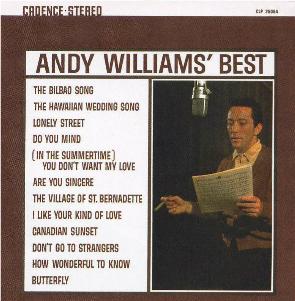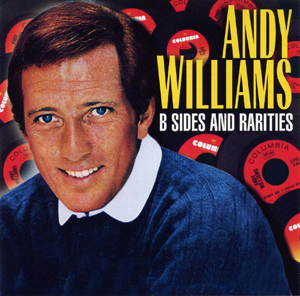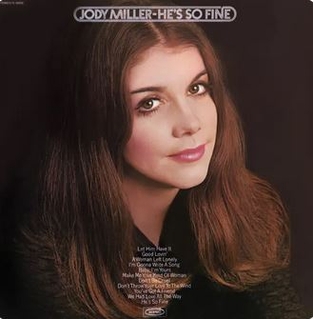
"Me and Bobby McGee" is a song written by American singer-songwriter Kris Kristofferson and originally performed by Roger Miller. Fred Foster shares the writing credit, as Kristofferson wrote the song based on a suggestion from Foster. A posthumously released version by Janis Joplin topped the Billboard Hot 100 in 1971, making the song the second posthumously released No. 1 single in U.S. chart history after "(Sittin' On) The Dock of the Bay" by Otis Redding. Gordon Lightfoot released a version that reached number 1 on the Canadian country charts in 1970. Jerry Lee Lewis released a version that was number 1 on the country charts in December 1971/January 1972 as the "B" side of "Would You Take Another Chance on Me". Billboard ranked Joplin's version as the No. 11 song for 1971.
"My Heart Cries for You" is a popular song, adapted by Carl Sigman and Percy Faith from an 18th-century French melody. The song has been recorded by many singers, the most successful of which was recorded by Guy Mitchell which reached No. 2 on the Billboard chart in 1951.

Myrna Joy "Jody" Miller was an American singer, who had commercial success in the genres of country, folk and pop. She was the second female artist to win a country music accolade from the Grammy Awards, which came off the success of her 1965 song "Queen of the House". By blending multiple genres together, Miller's music was considered influential for other music artists.

"Chug-a-Lug" is a song written and recorded by American country music artist Roger Miller. The song reached number 9 on the US Billboard Hot 100 in 1964, becoming his second pop hit.

"Dang Me" is a song by American country music artist Roger Miller, and 1964's Grammy Award winner for Best Country & Western Song. It was Miller's first chart-topping country hit and first Top Ten pop music hit, whose "jazzy instrumental section" helped make it "the quintessential example of Miller's lighthearted humor, which brought him many more hits."
"What About Me?" is a 1984 song written by Kenny Rogers, producer David Foster, and singer-songwriter Richard Marx. It was recorded by Rogers, Kim Carnes, and James Ingram as a trio song from Rogers' Platinum certified 1984 album of the same name.
"Long Gone Lonesome Blues" is a 1950 song by Hank Williams. It was Williams' second number-one single on the Country & Western chart. "Long Gone Lonesome Blues" stayed on the charts for 21 weeks, with five weeks at the top.

I'll Search My Heart and Other Great Hits is a compilation album by American pop singer Johnny Mathis that was released by Columbia Records in April 1964 and gathered up five A-sides that reached the Billboard Hot 100, a corresponding B-side, and six songs that had previously been unreleased.

Love Story is the twenty-seventh studio album by American pop singer Andy Williams that was released on February 3, 1971, by Columbia Records. This was another in his series of cover albums, but the title track, subtitled "Where Do I Begin", was the one song included that he originated.

You've Got a Friend is the twenty-eighth studio album by American pop singer Andy Williams, released in August 1971 by Columbia Records. The album bears a striking resemblance to the Johnny Mathis album You've Got a Friend released that same month. Besides sharing their name, the two albums are both made up of covers of easy listening hits of the time, with 11 songs each, and the two albums have seven songs in common that are positioned in a similar order.

Love Story is an album by American pop singer Johnny Mathis that was released on February 10, 1971, by Columbia Records and included a recent Oscar nominee, a flashback to 1967 ("Traces"), a new song by Bacharach & David, a lesser-known one by Goffin & King, and two songs that originated in film scores from 1970 and had lyrics added later: the album closer, "Loss of Love", from Sunflower and the album opener from Love Story, which was subtitled "Where Do I Begin". The norm for Mathis projects from this era was to cover recent hits, and the title track of this one was so recent that the version by Andy Williams began a 13-week run to number nine on Billboard magazine's Hot 100 chart in February 1971, coinciding with the release of this LP.

The Way We Were is the thirty-second studio album by American pop singer Andy Williams, released in the spring of 1974 by Columbia Records and was a return to singing songs that his audience was already familiar with after Solitaire, his previous LP that was less reliant on covers of recent pop hits, did not perform well.

You Lay So Easy on My Mind is the thirty-fourth studio album by American pop singer Andy Williams, released in November 1974 by Columbia Records. The idea for this LP was mentioned in an interview with Williams in the November 3, 1973, issue of Billboard magazine that emphasized his desire to move away from recording albums of Easy Listening covers of hits by other artists, noting that he was "planning an album to be cut in Nashville with Columbia's high-flying country-pop producer, Billy Sherrill." The article coincided with the release of his first attempt to shift directions, Solitaire, which performed poorly. A return to the Easy Listening hits formula, The Way We Were, followed in the spring of 1974 but failed to even chart, so this next attempt to eschew soft rock songs leaned heavily on Country hits.

Andy Williams' Best is a compilation album by American pop singer Andy Williams that was released late in 1961 by Cadence Records. This second album to compile the singer's material features 10 songs that made the Billboard Hot 100 along with two of their corresponding B-sides.

B Sides and Rarities is a compilation album by the American pop singer Andy Williams that was released by Collectables Records on May 27, 2003. Although the collection starts with two 1947 recordings by Kay Thompson and The Williams Brothers, the rest of the material comes from his time at Columbia Records and includes covers of contemporary hits as well as lesser-known material from the songwriters of "Can't Get Used to Losing You", "Home Lovin' Man" and "Moon River".

Greatest Hits is a live album by American pop singer Andy Williams that was digitally recorded live in concert at the Andy Williams Moon River Theater in Branson, Missouri and released by the LaserLight division of Delta Music Inc. in 1994. It includes performances of songs that he had previously recorded during his time with the Cadence and Columbia labels as well as one he had never recorded before -- "L-O-V-E", which Nat King Cole took to number 81 pop and number 17 Easy Listening in Billboard magazine in 1964.

When Will I See You Again is an album by American pop singer Johnny Mathis that was released in March 1975 by Columbia Records and was again predominantly composed of covers of recent hit songs by other artists.

"My Uncle Used to Love Me But She Died" is a 1966 song by Roger Miller. It was the fourth of four singles released from Miller's fourth LP, Words and Music, all of which became U.S. Top 40 Country hits.

He's So Fine is a studio album by American singer Jody Miller. It was released in August 1971 via Epic Records and contained 11 tracks. A majority of the album's material were covers of country and pop songs. Two of its covers were originally released as singles: the title track and "Baby I'm Yours". Both reached the top ten of the North American country charts and reaches other chart positions. The album itself reached the top 20 of the American country chart in 1971.

Good News! is a studio album by American singer Jody Miller. It was released in July 1973 on Epic Records and featured 11 tracks. The ninth studio album of her career, Good News! was a country-themed album mixing cover tunes with original material. Among its original songs were the singles "Good News" and "Darling, You Can Always Come Back Home". Both singles reached the top ten of the North American country charts in 1973. The album itself reached the top 20 on the American country chart in 1973. It was followed by a positive review from Billboard the same year.
















